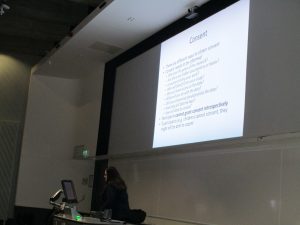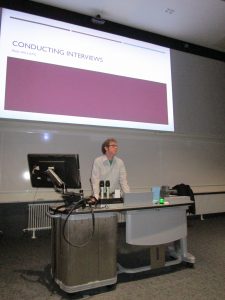This week I joined my colleagues Dr Felicity Henderson and Dr Jana Funke for a lecture on ethics and interviewing people. This was aimed at our final-year undergraduates, who are busy researching their dissertations right now. The English dissertation is an 8,000-word extended essay where students shape a distinctive research project in consultation with a member of academic staff. As well as tutorials with their dissertation tutor, students benefit from workshops and a weekly lecture based on sharing tips and advice on how to complete the dissertation. In this week’s lecture we helped the dissertation students think about the following: what ethical issues does your research generate? Are there certain principles by which you should always abide when devising the collection and publication of data? And what is good practice if your dissertation involves interviewing people?

Jana is the ideal person to talk about research ethics, since she is Chair of the College of Humanities Ethics Committee. You can see from her slide that she talked about the importance of getting informed consent from participants in our research.

I spoke about how to run interviews: organizing them in advance, learning to be a good listener, and tips on transcribing them afterwards. Based on my own experience I recommend that students avoid interviewing anyone next to a busy road on a windy day in a major city!
So what do the students write about in their dissertations? There is no ‘one-size-fits all’ template for a dissertation; they are as varied as our students’ research interests. To give you an idea, here are some dissertation titles from recent years:
- “Becoming a ‘Conceptual Bastard’: The Relationship Between Visual Culture and the Sexualization of Black Women’s Bodies from Humanism to Posthumanism”
- “‘Beth Redy for to Meete Hym Everemoore’: A Study of Death Personified in Three Medieval Texts”
- “Simile, Difference, and Translation in Christopher Logue’s War Music“
- “Animal Identity, Jungle Ruins and Adapted Environments: Postcolonial Ecocriticism in The Jungle Book(s)“
- Misinterpreting Allegory: Paradise Lost and Its Critics”
- “‘The Stranger Acclimatizes Everyday’: Reconceptualizing Liminality in the Palestinian Context”
- “‘It’s Aggressive But Sometimes You Need to Shout to Get the Point Across’: Grime and ‘Road Rap’ as a Challenge to Postimperial Melancholic Interpretations of the 2011 London Riots”
The dissertation is a challenging endeavour but it gives students the chance to take all the skills and knowledge they have gained over their degree and bring them to bear on a subject that they are passionate about. Within the framework of supervision, workshops, and lectures, they can craft a project that reflects their own interests, and pursuing a self-motivated research project where you have to set yourself targets and deadlines is great experience for whatever you do after your BA degree!
Last but definitely not least, the Department of English & Film at Exeter gives a prize for the undergraduate dissertation that best communicates the qualities of imagination and intellectual flair. Last year this award (the Gamini Salgado Prize) was presented to Rebecca Young for “‘See Her Brain – Go Round’: Emily Dickinson, Neurodiversity and the Matter of the Brain.” Well done Rebecca!
This doesn’t even cover the Creative Writing dissertation – come back later and I’ll tell you all about that too!